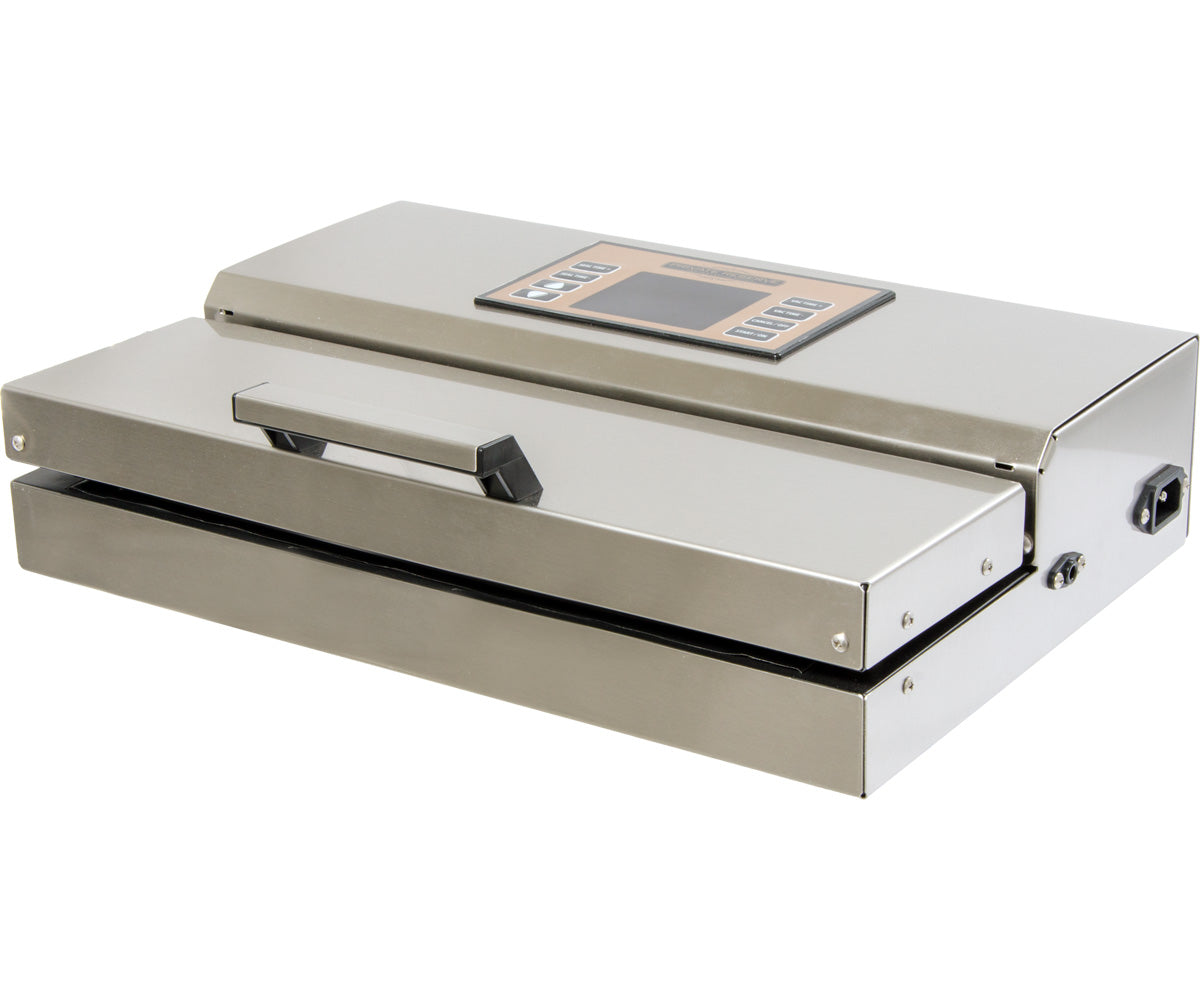Private Reserve
Private Reserve Commercial Vacuum Sealer
Private Reserve Commercial Vacuum Sealer
20 in stock
Couldn't load pickup availability
Payment options
- Fast Delivery
- Easy Returns
- Secure Checkout
Description
Description
Keep large amounts of your dried herbs and food fresh longer with the Private Reserve Commercial Vacuum Sealer. Air will oxidize and degrade your produce and food. This large-capacity system preserves your herbs and foods by removing excess air from the bag with a vacuum to create an airtight seal. The resilient multi-ply bag material locks air out, which prevents oxidation and freezer burn. The bags are tear and puncture resistant and durable. Best of all, the sealing operation is easy and quick.
The included food-safe bags are 80% polyethylene, 20% nylon, and BPA-free.
Seals compatible bags with openings up to 12.25 inches.
Heavy-duty performance
Double seal
User-definable vacuum and sealing times
Pulse vacuum function for delicate goods
Canister function
Marinate function
Multi-ply bag material is designed to lock air out
Puncture and tear resistant bags
Quick and easy sealing operation
Includes ten free vacuum bags
Mylar bags (sealing only) – Wait 60 seconds between each seal. This is to ensure the temperature bar doesn’t’ get too hot and cause damage to the unit. Start with a lower temp option to find the best seal.
Mylar bags (vacuum sealing) – The bag needs to have at least one side textured. If both sides are flat the bag can only be sealed, not vacuum sealed. The bag thickness can range from 50-250 micron (125 max single side thickness).
Share

INFORMATION QUESTIONS
FREQUENTLY ASKED QUESTIONS
What is Hydroponics?
Hydroponics is the science of growing plants without soil. The plants thrive on the nutrient-water solution alone. The growing medium merely acts as a support for the plants and their root systems while the solution passes freely. The growing medium, if any, is totally inert.
What types of plants grow best hydroponically?
Anything can be grown hydroponically, but some plants prove to be more space efficient. Some plants we suggest are tomatoes, sweet peppers, hot chilies, lettuce, spinach, squash, cucumbers, broccoli, beans, snow peas, herbs and flowers of all types.
Can you REALLY get better yields/quicker growth?
Absolutely. The plants, when receiving everything they need, tend to be healthier, faster growing and generally more productive. You can expect 30% faster growth with many crops.
What are the watering cycle timelines hydroponic systems?
Once the reservoir is filled with nutrients, it is time to put your hydro system to work! The ease of hydroponics is automation – automation is achieved by putting the pump on a timer according to your watering needs. The watering cycle depends on growth stage, growing medium and hydroponic system. In an ebb and flow or drip system with rockwool as the medium, seedlings, clones and plants in the early vegetative stage require watering only once a day for 15-30 minutes (twice a day for higher temps). Mature, flowering and fruiting plants require a heavier feed and can be fed once a day for 30 minutes (twice a day for higher temps). Typically soiless mixes and coco fiber can be watered for about 15 minutes twice a day, and can be adjusted for heavier feeding during the flowering and fruiting stage or higher temps. ViaStone, Hydroton, Grow Rocks, and Silicate mediums need to be watered more frequently – a constant drip for drip systems, and about 15-30 minutes every 3 hours for ebb and flow systems and can be adjusted for heavier feeding during the flowering and fruiting stage or higher temps. Aeroponic systems require frequent watering cycles; 30-60 seconds every few minutes or a constant spray.
What do I need to test pH? How do I test pH?
pH has a range from 0 (acidic) – 14 (alkaline), with 7 being neutral. A proper hydroponic pH range is between 5.5 to 6.2 for most hydroponic crops. For specific crop pH, check out our Plant Guide. pH must remain within the proper range for good plant health, disease resistance, and proper nutrient uptake. pH is maintained by adding pH Up and pH Down to the nutrient solution. For more information, see the Testssection of our site.
How will the flavor compare to my outdoor grown, organic produce?
The taste may be even better! This is simply due to the fact that the hydroponically grown plants are getting everything they need, when they need it. Don’t be fooled by “hot house” produce grown commercially. The grower’s primary concern is shipability and storage, not flavor. When you grow your own vegetables at home, you can expect nothing less than excellent results. Plus, hydroponically grown produce has the added benefit of a longer shelf life.

